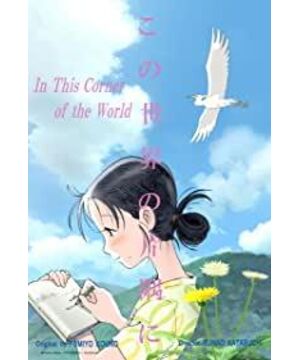The animation inherits the long-standing tradition of Nippon's life style, and depicts the life and psychological state of ordinary Japanese people during the war in a nearly line-drawing way. life, but also continuously permeated by the reality of war. The whole film is composed of trivial daily life, which can't be changed by dividing it into before the air raid and after the air raid. It just adds a bit of hardship to the connotation, but the heroine often tilts her head and looks not very smart and gentle. It makes this kind of suffering less heart-wrenching, and also makes this kind of joy into a gesture of ignorantly accepting all the arrangements of fate, just like the characters in Lu Xun's writings. However, as an audience with basic empathy ability and in modern society, in the face of constant destruction in daily life, even if the film maintains great emotional restraint, it cannot help but feel sympathy, but it will also be angry that it has never jumped once Out of the small circle of her life, but thinking about it, what would happen if you escaped? So this sense of individual powerlessness in the face of war continues to spread from daily life, forming the expression of the film, the so-called anti-war. But this is not enough, the audience's emotions need to be purified, and those of us who are waiting for Katasis finally saw the emotional explosion of the heroine. When the heroine heard the surrender of Yuyin broadcast, she knelt on the field and cried, and said two sentences before and after, "Didn't you agree to fight with all your strength?" "Do you have to succumb to violence?" Understand, even a German who opposes Nazis will feel heartache when he sees a flag planted on the Reichstag, but the more important thing is to accuse such absurdity, I lost a right hand to paint, lost my family, my hometown was The nuclear explosion cost too much, but it turns out that the war can be ended with a single word. And the second sentence is a tribute to the tenacity of vitality, and the core of the expression is similar to the Japanese version of "Alive": Even so, my life will continue, everything in the past will disappear, and I will continue to live happily, this is "My war" is also my revenge. Then I can probably understand why this film was rated as the No. 1 film of the year by Film Xunbao. But I didn't get cleansed because a lot of problems were created. From the creator's point of view, did he deliberately ignore the suffering of the people on the other side and present it as a kind of self-movement? In Japan's cognition, the people of course do not need repentance and apology. Anti-war is to cherish the current peace in order to resist the recurrence of war. Therefore, in almost all Japanese anti-war movies, it seems that the war is always present in the reflection of the suffering of ordinary people in the war. Does that mean that it is okay to admit that everyone is a victim of the war? The polarities of the reviews for this film show that this kind of problem is not There is a fair answer, because that narrative has long been engraved in the hearts of every Chinese along with the national anthem. More potentially, and more dangerously, this narrative can be mobilized when needed.
View more about In This Corner of the World reviews











